
Part 2 MARK STATMAN: MEXICO AND THE POETRY OF GRIEF AND CELEBRATION
Part 2 of my interview with Mark Statman looks closely at Mark’s Latin American poetic influences, his life in Mexico and ends with an extract
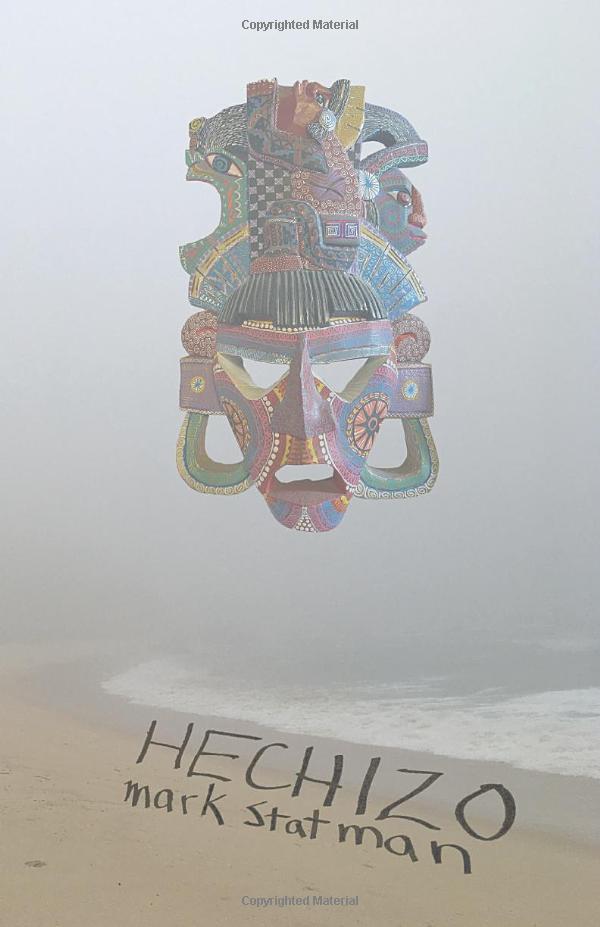
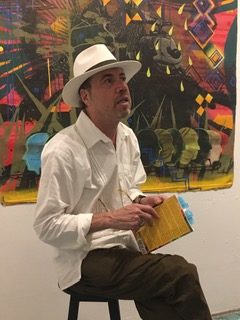
I interviewed international poet and translator Mark Statman about Hechizo his 11th published collection. Mark, who has won national arts awards, is Emeritus Professor of Literary Studies at Eugene Lang College of Liberal Arts, The New School, NY, and now lives in San Pedro Ixtlahuaca and Oaxaca de Juárez, Mexico.
Leslie: You describe your new book of poems Hechizo as “… the yin to the yang of Exile Home… I see the two books as talking to each other, though they each very much stand alone.” Can you describe the original conception and process of writing Hechizo, and how it relates to your previous book of poems, please?
Mark: The poems of Exile/Home are ones I wrote in the time just before and in the three years or so after my wife, the painter and writer Katherine Koch, and I moved from Brooklyn, to the city and state of Oaxaca in southern Mexico in September 2016. It was an interesting and extraordinary time for us. We were leaving New York, the city where both of us had lived most of our lives, for another country, another culture, another world. Oaxaca wasn’t unfamiliar to us, but, despite previous stays there for weeks and months, we really only knew it as tourists. We were about to become permanent residents of the country.
Exile/Home talks about those changes, works through and with them. I think of the words exile and home as nouns and verbs. We left Brooklyn because the Brooklyn we loved no longer existed. We came to Oaxaca because it was a place both of us felt deeply, in all senses—physical, emotional, aesthetic, intellectual, spiritual. Exile/Home celebrates the changes, celebrates our old lives and our new lives. Though the book leads off with the long poem, “Green Side Up,” written for my father who died in March 2018 and never got to visit us, the book is primarily joyful, upbeat. Our exile took us from home, it brought us home. That kind of idea.
What Exile/Home doesn’t address at all, I think, are the other things that were happening in the world. The election of Donald Trump, growing authoritarianism throughout the world, environmental degradation, a pandemic. It doesn’t address my own demons, the emotional and spiritual ones, nor my alcoholism, with which I struggled for many years. Though I’m sober, sobriety doesn’t make one’s problems go away, it just helps make me better able to solve those problems.
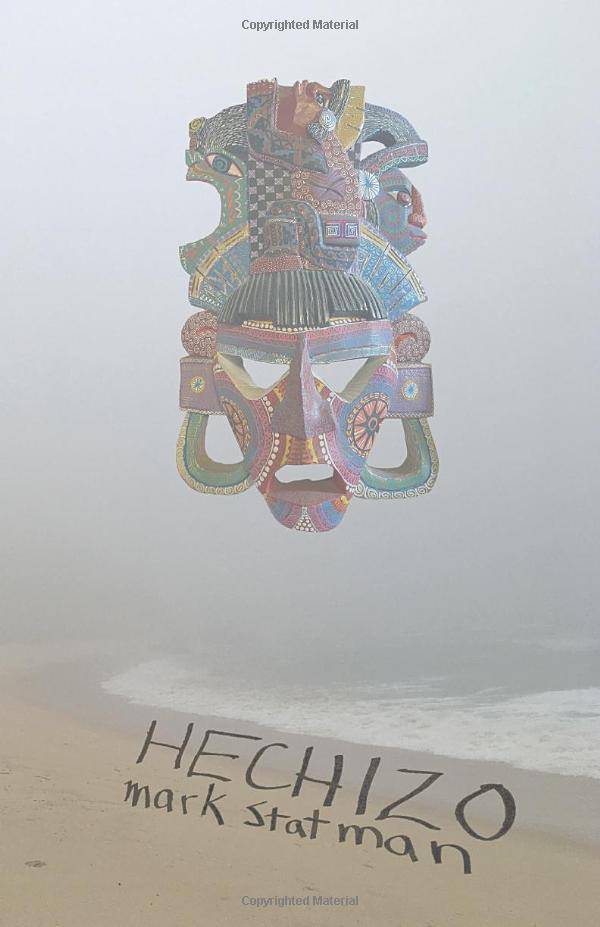
Hechizo addresses these things. An hechizo is a spell—it can be a good one or a bad one. In the book here, it’s both, because my demons and the world’s demons will cast their spells but there are always the voices in one’s life, and one’s own voice as well, that can cast a spell to counter the destructive ones. But the struggle is ongoing.
Mexico is both the subject and object of the book. I am too. And so is the rest of the world, but what I wanted to address in the book was the other side, the things that Exile/Home left out. The two books go together.
I use the yin and yang analogy to show how the books complement each other. But they don’t complete each other and this analogy is going to fall apart with my next book, which is going to kind of bring it all together, a third set of voices to work with the voices in the other two books.
Leslie: Can you give a picture of the dangers and rewards of living in southern Mexico? How has that experience affected you as a mature writer?
Mark: It’s a funny question about the dangers. If by danger, one means crime and all that, I’m such a New Yorker, you can’t ever take that out of me, that to me a mugging or a theft seems kind of normal. My New York street sensibilities take me pretty far. I know there’s talk of drug cartels and stuff like that, but those are mainly in the north of the country. The pandemic did hit Oaxaca, whose primary industry is tourism, pretty hard. So there has been an increase in street crime. Our house in town, and other houses in the area, were broken into.
But I don’t feel unsafe here. I know how to live in cities, know what’s smart and what isn’t. When visitors talk about getting robbed at 4 am after a night of drinking and they’re walking in neighborhoods of which they are clueless, I think, well, this is terrible that this happened, I hate it, but it happens like this in every city in the world. Pay attention.
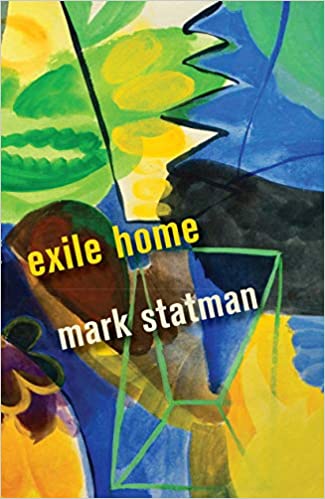
We have a rancho in the country, we even have a little cultural center there for readings, music performances, art exhibitions. I walk around at night all the time, not feeling in any danger at all. Does it help when I go on my walks, in centro or in the country that I have my 75 pound Labrador Retriever Apollo with me? Probably (laughing).
The rewards? Oh my. This is a stunning country and Oaxaca is a stunning state, with a history of art and poetry, music. A history of political activism. The indigenous voices here are quite strong. I’m spending so much time reading the Mexican poets, contemporary, modern, and going back to pre-Colombian. They are quite amazing and rarely talked about north of the border. I am studying a history which is rich and amazing and confounds all the things ever taught me in the northern schools.
But I’ve always loved Mexico, since the first time I came here in 1986. William Burroughs, a writer I rarely quote, notes in Naked Lunch how something falls off you when you cross the border from the United States to Mexico. That’s how I felt the first time I came here and continue to feel. Todos vuelven a la tierra—everyone returns and that’s how it’s been for me, as if returning. A funny thing for me is that my grandfather, my mother’s dad, loved Mexico and talked all the time about one day retiring here. And now it’s me with that life.
Now that I live here, life is measurably different. I’ve started the work to become a dual national, a Mexican and US citizen. I want to participate in that life. I don’t want to be seen as a guest, even an honored one, which is how I feel, but as a part of the body politic and a part of the process.
The effects on my writing have been intense. Hechizo and Exile/Home are books not just about Mexico and life here, but books that Mexico helped me write. By being away from the US poetry scene and the different winds that blow one this way and that, I’ve felt an incredible freedom. Not that I paid that much attention to the tempests and the fads, but I was conscious of them, I knew what was going on. Now I kind of don’t. I mean I know what’s going on, I read all the poets, my friends and my not friends, but the physical distance really does create an aesthetic distance. It’s just that I don’t worry much anymore. I just write. Grateful, very grateful, that there are amazing editors who publish me. An amazing shout out to Bill Lavender, first rate publisher and stunning poet. I’ve been fortunate to read his new augustine poems. They are wow.
But because of distance, the writing feels like it’s getting better. It feels like the kinds of things I dreamed I wanted to do, both formally and in terms of content, I’m doing. I’m not looking over my shoulder so nothing is gaining on me (pace Satchel Paige).
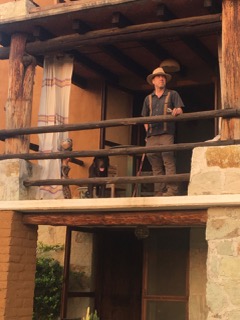
Leslie: Would you like to expand on how your personal demons enter and underpin Hechizo?
Mark: I’m not sure how much I can add that isn’t in the poems. I don’t think it’s much of an exaggeration that the politics of the world affects one.The political being personal. Environmental issues. A pandemic that changed everyday behavior. There was some beauty in the unreal way I could walk the streets of Oaxaca—the dog needed his walk!—and the eerie emptiness. Silence.
Personal demons. The death of my father brought out a lot. It was an important part of Exile/Home but in Hechizo I look more at the time after the death, the seasons of grief and loss, about the anger and struggles of his life and our lives. A whole section of the book has me facing my father, my father’s voice and voices, and his still-daily presence in my life. I think it resolves in love and presence, and I’m really glad I was able to write it.
In my new poems, not sure when that book will be ready, two years?—I once had a dream of a book of poems every two years! Now I’m happy to think my next book will be my twelfth. Should that make me happy? My dad’s father, my wonderful Grandpa Charlie, was a baker. We have a sincere relationship with bread in my family. So maybe I’ll be happier at a baker’s dozen.
My parents again figure a lot in the new work. My mom died this past September. The grief has overwhelmed me. More than my dad. But quieter. The tears flow a lot. At the age of 64, I’m suddenly and really an orphan. I have a great community here supporting me in that grief. In Spanish, the phrase is llevar luto. To carry or wear your grief. I certainly am. The grief presents me the chance to become hopeful. Hello Gloria Gaynor! I will survive.
Except in the notes at the end, I don’t specifically name my alcoholism, but anyone familiar with the disease will recognize the language and struggles. Alcohol hurt me emotionally, intellectually, and spiritually. It gave the furies and lizards in my mind—the figures of both are prominent throughout the book—reign over me and my life. The person I became because of this abuse could be abusive, cruel, awful. I never wrote about my problem before because I didn’t feel free to do so. Another liberating quality of life in Mexico, feeling more able to reveal all of myself and not just the side of me I thought people might want to read about. Sobriety—not just physical, the drinking—but emotional and spiritual is something I’ve had to work on a lot. In Hechizo, I think one sees that struggle. And, again, there’s a lot in the book, along with struggle, of resolution and reconciliation, with my father, Mexico, with the world, myself. It’s all a little uneasy because still ongoing. The problems are all still there. But how do I face them, the furies and the lizards? One day at a time.
My very dear friend, the poet Joseph Lease, whose new poems are frighteningly brilliant and will be published by Chax , describes this all as “soul-making.” Hechizo is a book deeply focused on what that is, does, means.
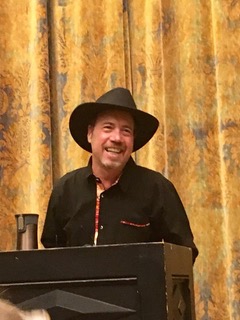
Leslie: You mention a new note of foreboding in your writing. With climate change already impoverishing the poorest parts of the globe, are poets reduced to archiving a vanishing lifestyle? Or should they be sending up a howl of protest – or even putting aside their poetry to concentrate on collective action to avert catastrophe? How do you see yourself within this spectrum of behaviour?
Mark: This is a very powerful question and I really don’t think there’s a single answer. In fact, I think your questions contain all the answers. Yes, we are archivists. Yes, we protest. Yes, we should put aside our poetry and act. I think it was Brecht who wrote that it was hard to write about the trees when there’s someone behind them shooting at you. It’s hard to write merely about the loveliness of the trees when you’re seeing them being destroyed.
But it’s complicated too. I live in a country which depends on the oil industry for its economic survival. For which the nationalization of the oil industry here, ending US domination of that industry, is a point of national pride. We kicked the gringos out! Ironically Mexico needs its oil industry to economically afford alternative energy technology. To be able to make sure there is health care, education, jobs. There is a great sense of environmental urgency but there is also an urgent sense of providing basic needs—clean water, electricity, food— for the people of the country.
What should the poets do? Whatever we can. Whatever makes sense for each of us to do. I’m not much of an agenda poet. I was recently writing with the poet Jordan Davis and I noted that being of, as David Shapiro has put it, the “immortal left”, I don’t need somebody beating me over the head with their agenda shovel. And I feel no need in my poetry to beat anyone over the head with mine.
When Donald Trump was elected president, I turned to my son, Jesse “Cannonball” Statman, a brilliant singer/songwriter, and said, well, I guess the work is still there, it just got a little harder. And what’s that work? Myles Horton said it was combining love and social justice. And as a poet, I’d add, beauty. One of the things I want to do is put beauty in the world, more beauty, more and more. Beauty that challenges us, inspires us, makes us more human and, if that, I guess, more beautiful.
Three Poems from Hechizo.
Kiss of your agony Thou gatherest,
O Hand of Fire
gatherest—
-Hart Crane, The Tunnel
You need the shadow of a child
Like an avalanche
-David Shapiro, Spring
E io, che di mirare stava iteso,
vidi genti fangose in quel pantano,
ignude tutte, con sembiante offeso.
-Dante, Inferno, Canto VII
1.
last night
lateness sleepless
the Mexican landscape
the mountains mountains mountains
their great dark spreading
voice
in my
head of
my head
of too much
dust too much light and
sadness numbness
the world in
collision or collapse an
inability to even say
words my words any words of
disappoint confusion of
love reassurance
they my furies
2.
come whenever they
want to come in
daylight dawn midday
the pursuit which isn’t
pursuit because they
are always here pursuit as
present present as
pursuit
they with
talons sweet faces (illusion)
with poems song they
enter my body they
insect swarm they insect
invade they insect (sweetly)
here to help destroy
(the streets filled
with rainy season rivers
carrying leaves carrying
those voices which
will later fill the
rain which will
later fill the air
and the streets
grow more and
more like rivers I
don’t remember ever
over decades this
much rain this
many ghosts these
many broken words rivers)
they
to
read my mind here
invading
here
to
hold in
dystopian night
dreams nightmares
the new-found old
disease (their
sweet faces their
sweet songs songs
we sang marching
we memorized we down
by the river we who
would not be moved we
were always moved we
were always lost their
sweet nostalgia how to
tell these inhumans from
the others from the
angels the muses how
to know what was
howl what was body
a body ready ready
for sleep there is
where the beauty save
there is no beauty
there is no beauty there is the
4.
despair)
they live
off fear and love from
fear and fever how and
with you (me) your
(my) whole life in childhood
they seemed worse
fear even worse they are
than death to live through
that splitting the burning
trap suffocation something
even to the gods unbearable
and even to God how
it would be the end of
stories the end of
faith of hope the lifelines
erased life disappeared
the political disappeared the
children disappeared the
history of the world
the ghosts who
call them the memories
who call them
this is their power they
5.
like the ghosts at
the unmarked ruins the
buried all you see
a hill a tree piles of stones
or in the market where a
woman with herbs you
ask her a question she
says try these a
mix she makes she
shakes her head it’s
the best she can do it’s
all she can do she
(about to say something)
stops
because there
inside the dreams again
in the body what the body becomes
attacked and no alarm no
warning just the breaking open
of the earth the cracking open
a shell a thin young tree
a mighty old tree a body
like the earth the body falling
the trees falling falling buried
by everything becoming in
itself of itself the furies
there with their anger
their disease they are
born of night or blood drops to
water or air and earth
—anger rage revenge—
their bright eyes
dark glowing with
6.
the sun the
midday sun the
empty city you
think (I think)
ciudad de fantasmas
echo of steps no
voices there’s bird-
song there’s street dogs
in the park at
the newsstand no one
no one and no
newspaper no diario
to say the news
you already know the
furies swarm the
skies overhead they
settle in the trees
waiting
for what
for you to think
to feel so they
know without seeing
exactly where
you are
7.
the furies they
took our
heroes who
stood up who stood who
were beaten down
in peace in protest in
love they took
them we let them we
because we clueless
helpless ashamed we
had become
less than the
one who doesn’t know
to inquire we
fell
we so
afraid we had
become
of light of
daylight of
how much must
fall before
the truth
8.
is this
what they
are for
you are
no hero
poet make
your peace
with age
make
your peace
with death
death
the world
death
the loved
death
your own
make it
peace
as if
there was
a choice
as if
in saying
no
there’s
something else
9.
it’s knowledge they whisper
(soft) they know everything they
live with the truth the horrible
truth and the horrible
whispers and the horror that they
are come come to me to
places and bodies to mind and
hearts come to me where
they belong
why can’t you act like a father?
my most insane dream
in some time it had
airports and train
stations my brothers and
I were there someone
had died I don’t know
who we were al
meeting up to travel together
to mourn like a spy Russell
approached me in
disguise wearing a wig
big glasses a woman’s
hat he whispered I
heard you were looking
for a sinner then David
appeared his hair
long and he
wasn’t gray he said we
have to get moving
we were at an
airport maybe Laguardia
then Grand
Central Station
they posted the names of
the trains but ours
wasn’t there then
in the middle of it all
emerging like vapor like
steam as if from a locomotive
my father stood
I thought
smiling but it was a
frown he was angry angry
we had summoned
him but we hadn’t or
I hadn’t I was just
traveling I was on my
way to someplace else I
said I don’t even live
here anymore New York
the United States not
my country not
me from the
vapor steam and choking
cloud hell-fire my brother
Stuart came the
youngest one the one my
father so differently
loved Stuart had
his hands around my
father’s neck we tried to
stop him tried to
tear his hands away Stuart
was crying and screaming
a voice from duende from
darkness spirit blessed
hated Stuart’s hair was
alive around his head
serpents I thought
Stuart choking my father
suddenly then suddenly
he looked like
Jesse my son Jesse he
looked Jesse then Stuart
then Jesse then Stuart
again and again until a final
again it was Stuart just
Stuart rage coal eyes
coals and flames his face he
looked so much like my
father choking him choking
himself we couldn’t
break his hold we all
choking my father none
of us could stop and I
had to wake up it was more
than I could take Stuart’s
voice all that was left
except the look on his face
in the dream he’d learned
something he hadn’t
done a terrible
terrible wrong
hechizo
Lleva en el cuerpo la casa en ruinas.
Abre la tierra,
siembra algo que nazca no muerto.
-Marianna Stephania
1.
the image in itself the
image longing the I
love you and far away
I see your photo
I
cannot see
you
you
don’t res-
pond you
in your distance in your
difference you say I’ve
never thought of you you
say this isn’t how I
think you ask me
what God I believe in you
tell me some kind of
story your own story your
own God it isn’t my God your
story your words crush it’s
my chest
I take
these words
one word written over
another you
would try to you would say
¡ay!
what would that close
what
will you
open will you
turn to me
2.
I have an idea to
put
magic in the
fire
make
some-
thing
more
than fire this
will take time for it’s cue
from the gods
(there are still gods?
(there were are?
there is some-
thing in me
which shall
tire Torture and
Time and
breathe
magic magic curse
when I
expire
then the past
haunts the future the
the way the past haunts
me
3.
wind rose
rosa de los vientos
rose of the winds a
map of the winds
the compass where
does magic do it’s magic
the winds
have suddenly
come up do you
know how hard
it is to
conjure
lightning
have you
ever been
struck
wizard?
(who is the wizard
(who is the wizard
I
dumbstruck if I
look in your eyes I go
down I go
who knows
have you
learned I am
helpless?
4.
my mother says she is a witch
my Uncle Jackie was the wizard
I learned the hard way
do not mess with my family magic
5.
magic older
than Hecuba older
than that witch that priest that older
tree it’s a pochote tree it divides
earth from sky those older branches that
older river we are at the river we
are at the river older older and
older the fire
far-
gone the
world the ancient what is
the word I want to use to say before
there was a language before there
was breath before there was chaos and
order before there was the day or the
night you would walk around words
of careless inequality have
you heard the story of the wise
man he was an old wise man
he was our wisest wise man he
sold himself out to some magic
it wasn’t temptation it wasn’t
greed it wasn’t desire he thought
it is an art form it is an art form I
can become the
fallen in love I can
rescue the
fallen in love he was
fallen into the
wisdom of
no
and
6.
your word is an ancient word
your youth is an ancient world
your God is not mine but mine is
older mine will not refuse your God a
thing
7.
the wind comes
from all
directions the wind
fierce it is
fierce it is
going to blow the
house down it is
going to blow worlds
apart we have no
recourse but to
jump into the
dream not the
mirror the mind
wants mirror it
always wants mirror but
this shape across the
table this shape across
the dark night horizon makes
magic it possesses will
give you your sleep and
put you there s
o who
will wake up well you
asked the question you
decided to wonder who
it will be you or me you or
me
ABOUT LESLIE TATE’S BOOKS:

Part 2 of my interview with Mark Statman looks closely at Mark’s Latin American poetic influences, his life in Mexico and ends with an extract

I interviewed international poet and translator Mark Statman about Volverse/Volver, his 14th published collection. Mark, who has won national arts awards, is Emeritus Professor of Literary

I interviewed Lisa Dart, finalist in the Grolier, Aesthetica and Troubadour Poetry Prizes and author of The Linguistics of Light (poems, Salt, 2008), Fathom (prose

I interviewed writer Julia Lee Barclay-Morton about her experience of autism. Julia began as an experimental dramatist in New York, moving to the UK to

I interviewed Gillean McDougall from Glasgow, who edited the collaborative projects Honest Error (on Charles Rennie Mackintosh and his wife Margaret Macdonald) and Writing the
| Cookie | Duration | Description |
|---|---|---|
| cookielawinfo-checkbox-analytics | 11 months | This cookie is set by GDPR Cookie Consent plugin. The cookie is used to store the user consent for the cookies in the category "Analytics". |
| cookielawinfo-checkbox-functional | 11 months | The cookie is set by GDPR cookie consent to record the user consent for the cookies in the category "Functional". |
| cookielawinfo-checkbox-necessary | 11 months | This cookie is set by GDPR Cookie Consent plugin. The cookies is used to store the user consent for the cookies in the category "Necessary". |
| cookielawinfo-checkbox-others | 11 months | This cookie is set by GDPR Cookie Consent plugin. The cookie is used to store the user consent for the cookies in the category "Other. |
| cookielawinfo-checkbox-performance | 11 months | This cookie is set by GDPR Cookie Consent plugin. The cookie is used to store the user consent for the cookies in the category "Performance". |
| viewed_cookie_policy | 11 months | The cookie is set by the GDPR Cookie Consent plugin and is used to store whether or not user has consented to the use of cookies. It does not store any personal data. |
One Response
Love the poems. Love your Oaxaca backstory. Love Leslie Tate.